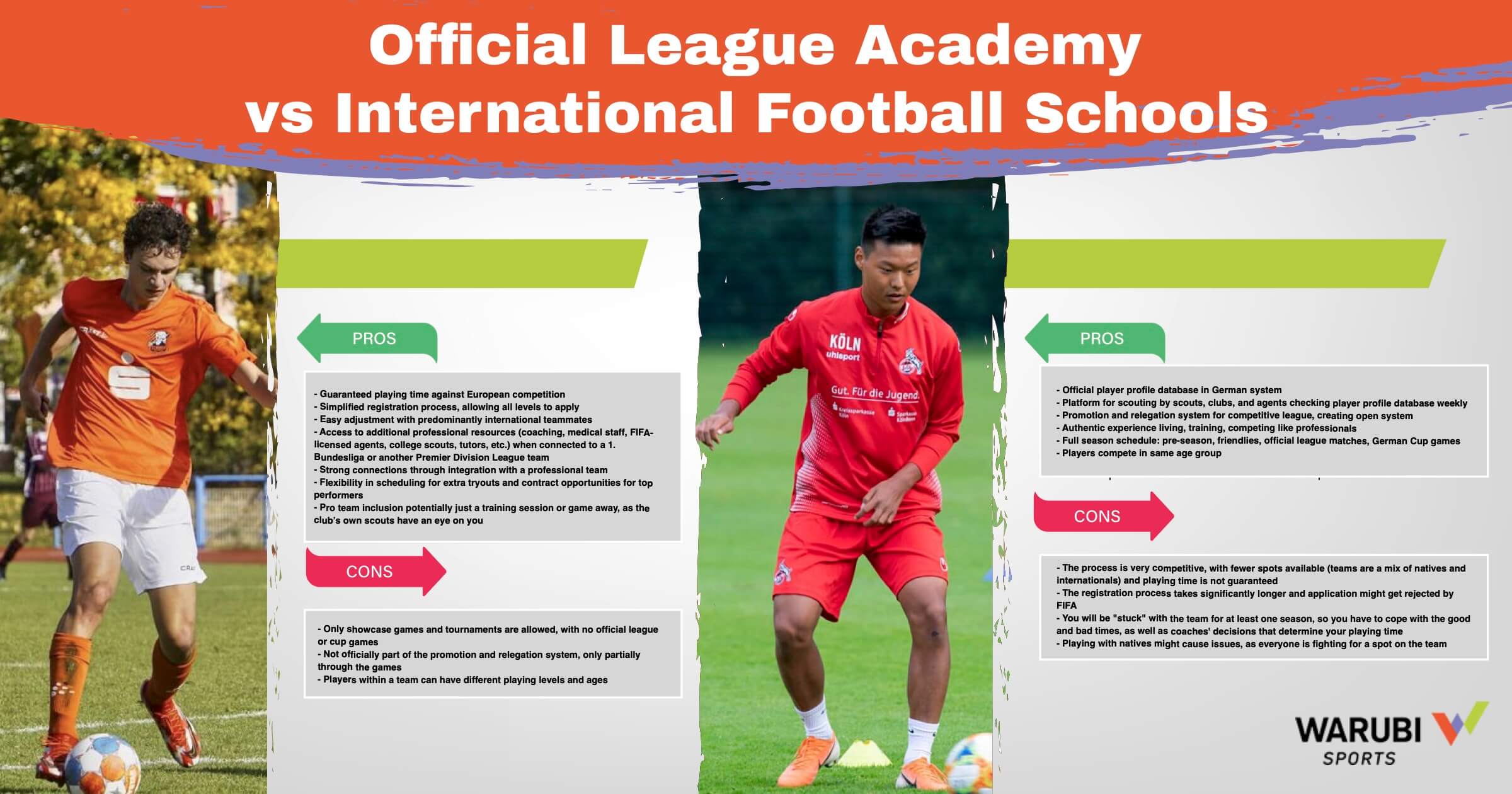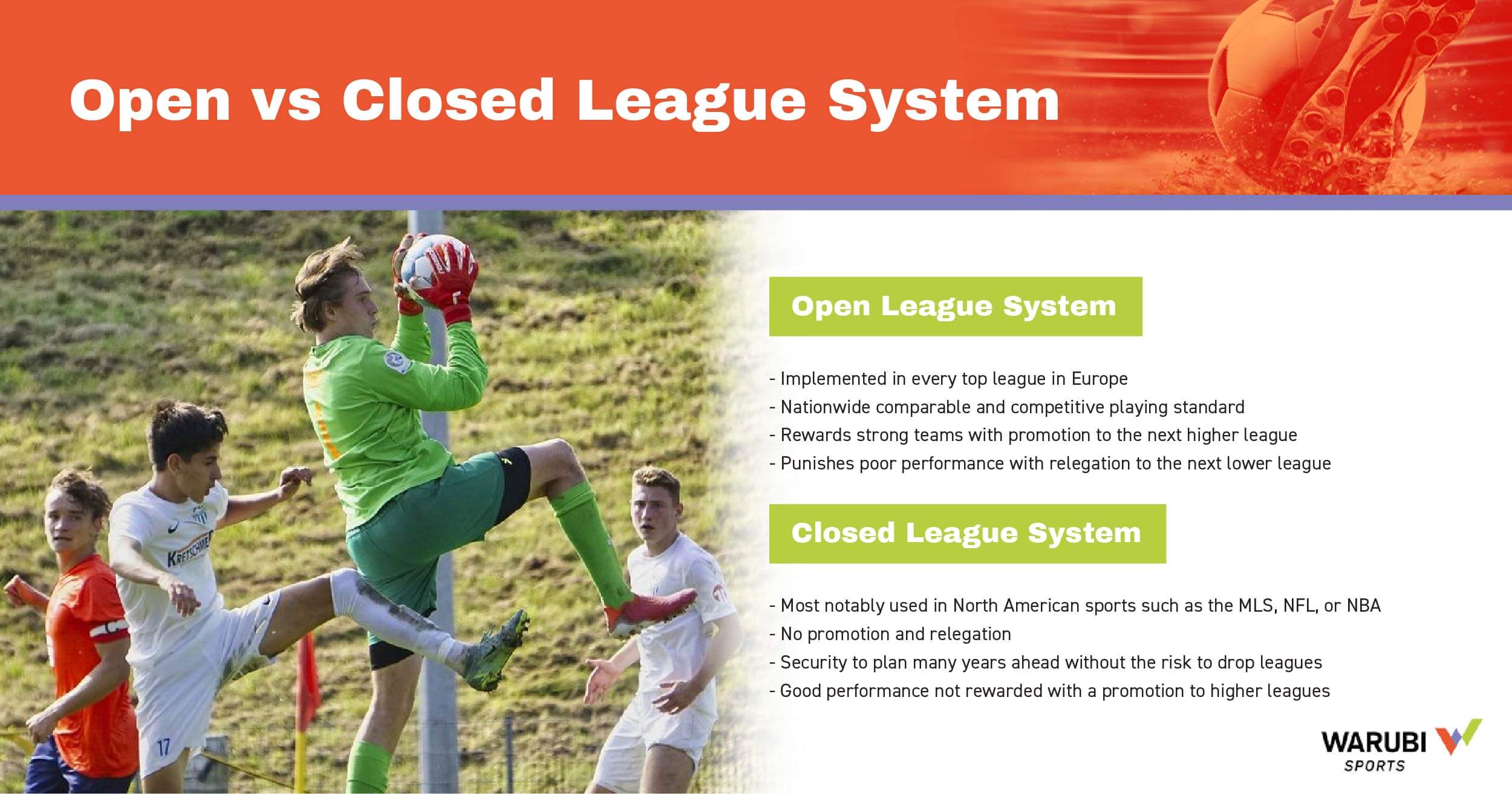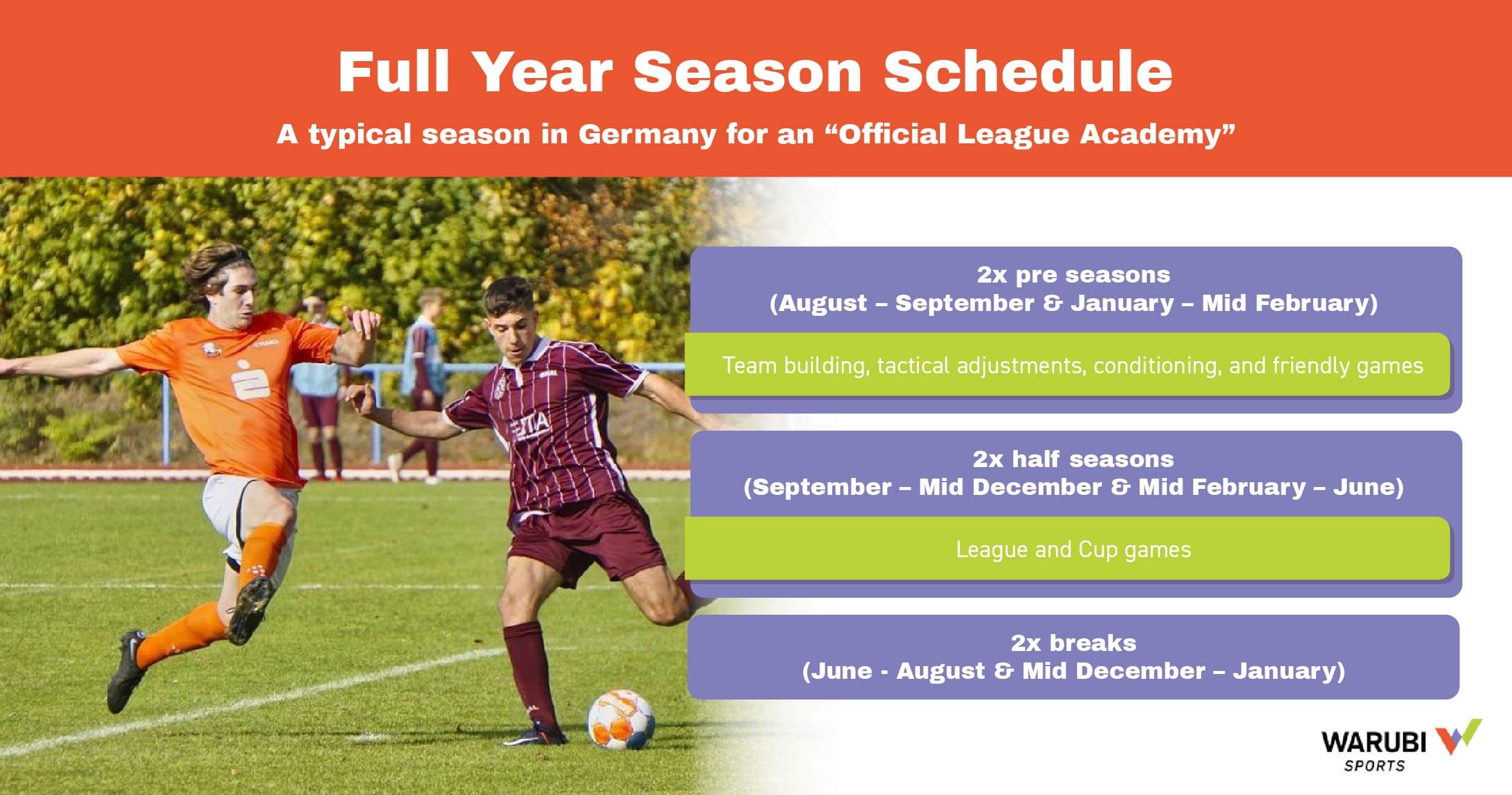Table of Content - German Soccer Academies: Top 3 Insider Tips for Success
Playing in Europe is the dream of many soccer players worldwide, and we recommend trying it at least once during your youth career. One of the top destinations for international players is a German soccer academy. Germany is known for its strong soccer culture and has produced some of the world’s best players and teams, so it’s not surprising that many aspiring soccer players dream of attending a soccer academy in Germany to learn from experienced coaches and compete against top-level competition.
One of the biggest benefits of attending a soccer academy in Germany is the level of coaching and instruction you’ll receive. German soccer academies are known for their emphasis on technical skills and tactical awareness, and many are affiliated with professional clubs that provide access to top-level facilities and equipment.
However, it’s important to note that the vast majority of players without a European passport are not allowed to play in official games. In fact, only about 5% of the international programs available allow for the integration of international players in their youth academy in order to play official games. If you’re considering playing soccer in Germany, here are the top three things you should know:
Residential Soccer Academies in Europe – ‘Official League Academy’ vs. ‘International Football School’
FIFA has very strict guidelines for players without a EU passport that limit almost every club’s ability to integrate international youth players without a European passport. These rules, which were implemented to protect minors, allow for transfers under very few circumstances. That’s why there are now two models in Europe:

'International Football School'
Many clubs in Europe establish what are known as ‘International Football Schools’. Approximately 95% of these international programs belong to this category. These programs are usually associated with large clubs in the Bundesliga, such as 1.FC Köln, Eintracht Frankfurt, or FC Schalke and offer a German experience. The main difference between an ‘Official League Academy’ and these programs is that you are not joining the official academy of a Bundesliga team or any other official German league. However, these programs offer great connections and a competitive, friendly game schedule. Being associated with a professional team might also give you an edge in future soccer and job opportunities.
Example – ‘International Football Schools’ > 1. FC Köln https://warubi-sports.com/fc-cologne-footballschool/
Here are the pros and cons of ‘International Football Schools’:
Pros:
- Playing time against European competition can be guaranteed
- The registration process is easier compared to official games, allowing anyone to sign up regardless of their level
- It is easy to adjust as teammates are mainly international
- Many additional professional resources (coaching and medical staff, FIFA-licensed agents, and college scouts, tutors, etc.) are available if connected to a Bundesliga or another Premier Division League team.
- Great connections due to the integration and affiliation with a professional team
- Flexible schedule allows for additional tryouts and contract opportunities for high performers
- Making it to the pro team might just be one training or game away, as the club’s own scouts have an eye on you
Cons:
- Only showcase games and tournaments are allowed, with no official league or cup games
- Not officially part of the promotion and relegation system, only partially through the games
- Players within a team can have different playing levels and ages
‘Official League Academy’
If you are recruited to play in an ‘Official League Academy’, congratulations! However, this model also brings challenges that need to be considered beforehand.
Example – ‘Official League Academy’ > https://warubi-sports.com/international-soccer-academy/
Here are the pros and cons of the ‘Official League Academy’ model:
Pros:
- An official player profile database in the German system
- A platform to get scouted by scouts, clubs, and agents who check the player profile database every week
- The promotion and relegation system is key to a competitive league system, creating an open system
- An authentic experience to live, train, and compete for points like in the professional world
- A full season schedule with pre-season, friendly games, official league matches, and official German Cup games
- Players compete in the same age group
Cons:
- The process is very competitive, with fewer spots available (teams are a mix of natives and internationals) and playing time is not guaranteed
- The registration process takes significantly longer and application might get rejected by FIFA
- You will be “stuck” with the team for at least one season, so you have to cope with the good and bad times, as well as coaches’ decisions that determine your playing time
- Playing with natives might cause issues, as everyone is fighting for a spot on the team
Open vs Closed League System

Germany’s soccer leagues are among the best in the world, and attending a German academy will give you the opportunity to test your skills against some of the best players in the world. This can be a great way to improve your game and prepare for a professional or college career.
Germany has an ‘Open League System.’ The Open League System is used in almost every top league in Europe, such as the German Bundesliga soccer pyramid. This system is widely considered the key to a nationwide comparable and competitive playing standard, as it rewards strong teams for their performance (promotion to the next higher league) and punishes poor performance (relegation to the next lower league).
The ‘Closed League System’ is most notably used in North American sports, such as the MLS, NFL, or NBA. For example, the MLS is a closed league system with no promotion and relegation. The biggest advantage is that teams have the security to plan many years ahead without the risk of dropping out of the league (and thus losing money and reputation) due to poor performance. However, new teams competing in different tiers cannot ‘earn’ a spot in the league through good performances.
Soccer Season in Germany

The soccer season in an ‘Official League Academy’ in Germany typically runs from August to June, with a brief break during the winter months:
- 2x pre-seasons (August-September and January-mid February)
- 2x half-seasons (September-mid December and mid February-June)
- 2x breaks (June-August and mid December-January)
The first pre-season (‘Sommervorbereitung’) usually starts in August and lasts for about 2-4 weeks, with a focus on team building, conditioning, and friendly games. Then the first half of the competitive season (‘Hinrunde’) starts in September, with league and cup games. The winter break lasts from mid-December until beginning/mid-January (‘Winterpause’). The second pre-season (‘Wintervorbereitung’) starts in mid-January and focuses on conditioning, tactical adjustments, and friendly games. The second half of the competitive season (‘Rückrunde’) with league and cup games lasts from mid-February until May or June, depending on the league’s schedule.
‘International Football Schools’ are more flexible and usually do not follow the same season schedule as an ‘Official League Academy.’ Opponents need to prioritize their own league games, so the majority of the friendly games are determined on short notice and pending availability. This schedule provides more flexibility and opportunities for trials and additional experiences with other clubs!
Conclusion - Should I join a German Soccer Academy?
Of course, attending a soccer academy in Germany isn’t for everyone. It can be a challenging and demanding experience that requires a significant commitment of time, energy, and money. But for those who are willing to put in the effort and investment, the rewards can be well worth it.
Overall, soccer academies in Germany offer aspiring players an unparalleled opportunity to learn from experienced coaches, compete against top-level competition, and develop the skills and techniques they need to succeed. If you’re serious about pursuing a career in soccer, attending a German academy can be a great way to take your game to the next level and stand out from the crowd, improving your chances of securing a professional contract or a college soccer scholarship.
Additional Resources
Soccer academies in Europe are looking for talented international players for a variety of reasons. One reason is to tap into a global pool of talent. These academies recognize that soccer is a global sport and that there are talented players from all over the world. By recruiting international players, they have the opportunity to bring in players who may not have been discovered or developed in their own country. This can help the academy build a more diverse and talented team.
Learn how to get scouted in Europe with this informative interview featuring a football agent from a big European agency. In this video, he provides valuable tips and advice for aspiring players, emphasizing the importance of research, patience, and realistic expectations.
The path to becoming a better player isn’t a straightforward one. Today, we’re going to dive into one player’s journey, who has pretty much seen it all, from the German Bundesliga academy with teams like Borussia Dortmund to the NCAA D1 powerhouse, Louisville, to the MLS draft, to Toronto FC. Then he transitioned into coaching at the top university, North Carolina Tar Heels, and pursuing a PhD at Premier League Top Club, Chelsea London. Let’s explore how this journey could potentially inspire and guide you.
Orlando City SC added two attacking players and two defenders to its squad in the MLS SuperDraft presented by Adidas. Our player Luis Grassow, a center back for the University of Kentucky, was chosen among the group.





